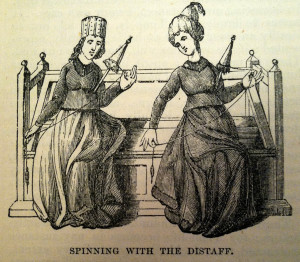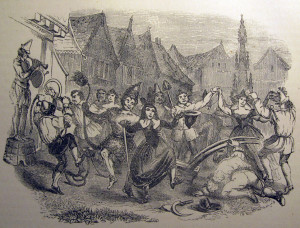ST. DISTAFF’S DAY
January 7
Even as the Twelve Days of Christmas end, Christmas, in its way, lingers: The season has such a grand presence that even what follows is informed by it or comes about as a result of it. And so it goes with today, the Seventh of January, when we celebrate St. Distaff’s Day, which is the first of two Back to Work holidays that come about after the Twelve Days. This one is for the women. The next Back to Work holiday is for the men. It’s called Plough Monday, and it comes on the Monday after Epiphany, which this year is on the Eighth, but, depending on the day of the week on which Epiphany falls, could be up to six days later than St. Distaff’s Day. This suggests to me that it was the men who made the rules here. Be that as it may, it is Robert Herrick, our wonderfully convivial 17th century British poet, who gives us our best description of the day (and some very good advice in the first two lines):
Saint Distaff’s Day, or the Morrow after Twelfth Day
by Robert Herrick, 1648
Partly worke and partly play
Ye must on St. Distaff’s Day:
From the Plough soone free your team;
Then come home and fother them.
If the Maides a-spinning goe,
Burne the flax, and fire the tow:
Scorch their plackets, but beware
That ye singe no maiden-haire.
Let the maides bewash the men.
Give St. Distaff all the right,
Then bid Christmas sport good night;
And next morrow, every one
To his owne vocation.
Women have always had a lot of domestic tasks to handle, but during the Twelve Days of Christmas, one of those tasks would be paused: the spinning of fiber to make cloth. And if she had a spinning wheel in her home, on the afternoon of Christmas Eve each year, when greenery from nature would be brought in to decorate the home, one of the key items to be decorated was the spinning wheel: greenery would be wound through all the spokes and over the wheel and it would be beautiful of course but also, as a result, unusable. Which was the whole point. No work was to be done for the Twelve Days of Christmas––though we can be sure that the women had plenty of other work to do during the holiday. And on this day each year, January 7, the day following Epiphany, it was back to the spinning for the women, and it was St. Distaff who led the way.
Oh but wait! This saint is no saint at all. Saints were real people like you and me before they were named saints, but St. Distaff is fictional. The English have a long history of creating saints’ days for saints that never existed at all. St. Monday was the name given to the long weekends sometimes taken by shoemakers, and St. Tibb was often used as a metaphor for never, as in, “Hey, I lent you a shilling last week; when will I get my money back?” “Worry not, I’ll be sure to have it back to you by St. Tibb’s Day.” Which is all well and good until the lender realizes that there is no St. Tibb’s Day. Neither St. Tibb nor St. Monday ever existed; nor did St. Distaff. The distaff, however, was a central tool to what was considered in those days “Women’s Work”: the spinning of wool or flax to make fiber for weaving into cloth. The distaff and spindle were the tools that preceded the spinning wheel, and rare it would have been to find a woman who knew not how to use them. We get the word spinster from this, which was once a recognized legal term in England to describe an unmarried woman, and the terms spear side and distaff side were also legal terms to distinguish the inheritances of male from female children.
And so the women returned to their spinning each Seventh of January, this “morrow after Twelfth Day.” Meanwhile, the men were still underfoot in the house. Their job on St. Distaff’s Day was one of mischief, with the goal usually being to set fire to the flax the women were spinning. The women were wise to this custom, though, and typically kept several buckets of water nearby. Very often, it was the men who got the worst of it: to have a bucket of water dumped on you in the cold of January (that’s the “bewash the men” part)… for sure, St. Distaff’s Day lent a bit of excitement to the sport of returning to ordinary time. Meanwhile, the men had customs of their own to attend to, preparing for their day.
PLOUGH MONDAY
First Monday after Epiphany, which this year will be Monday January 8
The men got a moveable date for their traditional Back to Work day. The men’s work focused on the farm, and on this Plough Monday it would be not at all unusual to see a gaggle of men parading through the village with a finely decorated plough. The men themselves would be finely decorated, too, in all manner of foolish costumes, hearkening the Feast of Fools aspect of the Twelve Days of Christmas that have just passed. One man will be dressed as the Bessy, an old woman, and there she is again: the personification of the old hag of winter, the goddess in her crone stage. There would be mysterious old dances and a good deal of noise in the banging of drums and the blowing of horns, and perhaps the performance of an old mummers play, and, certainly, there would be a collection box passed around to help pay for the sport (as well as a few rounds at the tavern). There would be a ceremonial ploughing of the ground, too, very often through the dirt road that ran through the center of town. Those who were too stingy to contribute risked having the path from the road to their door ploughed, as well. Best, then, to contribute a few pennies to the men’s sport.
There is another old tradition in the Netherlands for this First Monday after Epiphany, little known, but important to those in the print trade (and to us here at Convivio Bookworks, for we are, at heart, a print shop): It is Copperman’s Day, a traditional Dutch printer’s holiday in which the printshop apprentices would be given the day off so they could work on a project of their own. The small prints that were a result of the day were typically sold for a copper apiece. I’ve been a printshop apprentice many times in my life: before, during, and after grad school, while I was earning my MFA in the Book Arts from the University of Alabama, I would go to Maine each summer to apprentice with various printshops there: once with David Wolfe at Wolfe Editions in Portland, and twice with Brother Arnold Hadd at the Shaker Press at the Sabbathday Lake Shaker Community in New Gloucester… which began our long friendships with both wonderful guys, but especially with the Shakers, who by now are like a second family to us.
I make a Copperman’s Day print most years… but, as with everything else here at Convivio Bookworks, I tend to be a little slow about it, and though I’ll begin on Copperman’s Day, or maybe even on St. Distaff’s Day, it will be pretty amazing if I finish by the time Copperman’s Day is done. When this year’s print is done, though, I will let you know here on the blog, and perhaps even show you some progress on our Instagram page (@conviviobookworks). Meanwhile, CLICK HERE to see all of our previous Copperman’s Day prints. Just like St. Distaff’s Day and Plough Monday, you’ll find our Copperman’s Day prints are also informed by a lingering Christmas spirit. This year’s will be no different.
And so: Back to work, back to the workaday world. In this house we are holding on to our Christmas greenery and music all through January, until Candlemas, as is our custom… but even with these trappings of Christmastime still in the house, we are back to earning a living again, and earning our daily bread, and back to regular routines.
Today’s two images, like bookends on this chapter, are taken from the Chambers Bros. Book of Days, published in Edinburgh, 1869. The top one illustrates their chapter on St. Distaff’s Day; the bottom one, Plough Monday. You may click on each to make the images larger.


What a delightfully informative post!
Though I neither spin nor plough, I have much work to do. But it is Sunday. I think I’ll take a nap.
That’s the best choice under the circumstances, Linda. Thank you for reading and enjoying and commenting!
A wonderful post! But we mustn’t forget that both women and men worked all through the Twelve Days of Christmas. The work they abstained from was unnecessary work (as on Sundays and Holydays). This included ploughing and spinning. Men still had to feed and water livestock, milk cows sheep and goats, etc., and women still had to prepare meals, see to children, clean living spaces, and keep fires going, among other tasks. I don’t think saying that men made the rules is accurate or just. When speaking or writing about times past we must be careful not to impose current cultural values.
Very good point, Scott. I’ve spent time in agricultural communities and you are absolutely right: there are daily tasks to be done no matter if it’s Tuesday or if it’s Christmas Day, and each person has his or her tasks to do. In my attempt at humor, I did a disservice to the men. I appreciate the very kind reprimand!